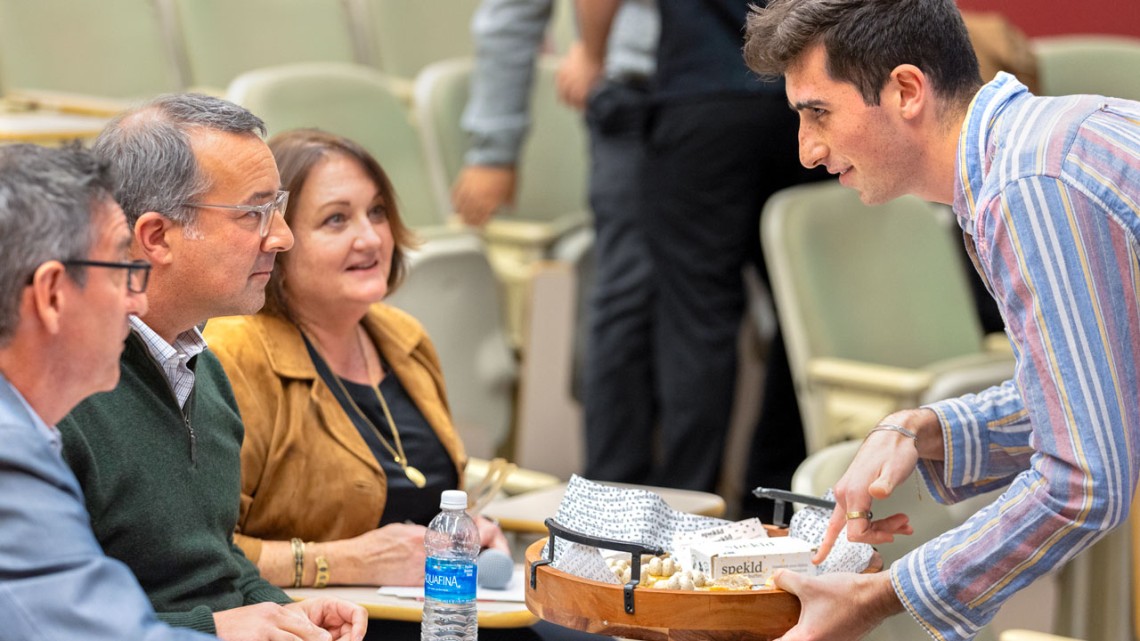
Jonah Gershon ’24 presents his product, sticks of brown butter called spekid, to judges at the annual Hospitality Pitch Deck Competition.
Brown butter rises to the top at Pitch Deck Competition
By Sherrie Negrea
Jonah Gershon ’24 was baking a batch of Mexican hot-chocolate-flavored sugar cookies on a Food Network competition last year when the idea came to him: Why spend 20 minutes creating brown butter for your recipe when it would be quicker to buy it off the shelf?
Since sticks of brown butter are not available on the market, Gershon decided to develop the product himself. After refining the concept in a class on communication for entrepreneurs, Gershon’s product – spekld – won first place in Cornell’s Hospitality Pitch Deck Competition, held Nov. 7 at Statler Hall.
“This is really exciting,” Gershon said. “I’m planning on doing a few production runs and this will really help with funding that.”
A total of 39 students in 29 teams vied for a $3,000 top prize in the eighth annual Hospitality Pitch Deck Competition. Six judges narrowed down the field to four semifinalists, and three judges selected the top three winners after the final round of presentations.
The judges agreed that Gershon was the clear winner because of his idea and his presentation. “The quality of the product and the quality of the presentation were aligned – they were equally excellent,” said Mark Maynard ’90, a judge and business advisor at Maynard Consulting.
The second-place prize of $2,000 was awarded to Jean Salamoun ’25 and Talal AlHusayni ’25, for smpl, a startup that will offer an affordable late-night menu from a food truck on campus. And the third-place prize of $1,500 went to Olivia Hosie ’26, for Liv Well Yogurt, a plant-based yogurt she hopes to produce in Ithaca.
Hosted by the Leland C. and Mary M. Pillsbury Institute for Hospitality Entrepreneurship at the Cornell Peter and Stephanie Nolan School of Hotel Administration, the competition gives student-entrepreneurs an opportunity to hone their pitching skills and the potential to earn seed funding for their startups.
Another key benefit is the feedback the students receive from the judges. “When they submit their slide decks, they’re getting reviewed by some really knowledgeable, successful business people,” said Nolan School senior lecturer Andrew Quagliata, who created the competition in 2016.
“After the first round, even if they don’t make the finals, students receive quite a bit of feedback on their decks,” he said. “And those who make the finals get to practice their communications skills outside the classroom.”
This year, for the first time, all four finalists pitched ideas related to food, Quagliata said. The fourth finalist was Ariadne Billy, a master’s student in the Cornell Baker Program in Real Estate, who proposed Gather, a startup that would host large community dinners in partnership with local restaurants.
Ellen Yui, founding director of YUI + Company, a strategic consulting, branding, and communications firm, said she was impressed with all four finalists. “They were great presenters, and I could really see the personality of the companies, the innovators and the entrepreneurial teams,” Yui said.
Gershon, a Nolan School student, began developing his idea to commercialize brown butter in Quagliata’s class, Communication for Entrepreneurs, in fall 2022. Four months earlier, the Food Network had taped the 2022 Christmas Cookie Challenge in Knoxville, Tennessee; Gershon was recruited by the network to participate based on the photos of his baked goods on his Instagram account.
Though his cookies – spiced with cocoa, cinnamon and cayenne – did not win, his experience creating brown butter under the show’s time constraints made him realize it could become a marketable product. “That pain point led me to deciding maybe this is something other people struggle with and view as a hassle,” said Gershon, who grew up cooking for his family in West Hartford, Connecticut.
After placing second in last year’s Pitch Deck Competition, Gershon won $20,000 in June at the inaugural Northeastern Dairy Product Innovation Competition, an initiative cosponsored by Cornell’s Center for Regional Economic Advancement and Northeast Dairy Foods Research Center. He’s now working on spekld with eLab, a student accelerator on campus, and doing pilot production runs at the New York State Agricultural Experiment Station, operated by Cornell in Geneva.
“I’m hoping at the end of the school year I’ll be able to sell it,” he said. “I still have a lot to figure out on the production side, but hopefully I’ll be able to produce it in New York somewhere because we do have a very strong dairy industry.”
Sherrie Negrea is a freelance writer for the Cornell SC Johnson College of Business.
Media Contact
Adam Allington
Get Cornell news delivered right to your inbox.
Subscribe
